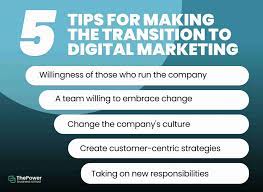The Era of Digital Marketing Transformation
In today’s fast-paced digital world, businesses are constantly evolving to keep up with the ever-changing landscape of marketing. One of the key aspects driving this change is digital marketing transformation. Digital marketing transformation refers to the process of integrating digital technologies into all aspects of marketing to adapt to the shift in consumer behavior and preferences.
With the rise of social media, mobile devices, and online shopping, traditional marketing strategies are no longer as effective as they once were. Businesses now need to embrace digital marketing transformation to stay relevant and competitive in the market.
Digital marketing transformation involves leveraging data analytics, artificial intelligence, automation tools, and other digital technologies to create personalized and targeted marketing campaigns. By understanding consumer behavior and preferences through data analysis, businesses can tailor their marketing efforts to reach their target audience more effectively.
Furthermore, digital marketing transformation allows businesses to engage with their customers on a more personal level through social media platforms, email campaigns, and interactive websites. This level of engagement helps build brand loyalty and trust among consumers.
In conclusion, digital marketing transformation is essential for businesses looking to thrive in today’s digital age. By embracing digital technologies and adapting their marketing strategies accordingly, businesses can stay ahead of the competition and connect with their target audience in a more meaningful way.
Five Key Benefits of Embracing Digital Marketing Transformation
- Increased reach and visibility to a global audience through online channels.
- Ability to target specific demographics and personalize marketing campaigns for higher conversion rates.
- Cost-effective compared to traditional marketing methods such as print or TV ads.
- Real-time data analytics provide valuable insights for optimizing marketing strategies and measuring ROI.
- Enhanced customer engagement and interaction through social media platforms, improving brand loyalty.
Three Challenges of Digital Marketing Transformation: Initial Costs, Data Privacy Concerns, and Navigating Rapid Technological Changes
Increased reach and visibility to a global audience through online channels.
Digital marketing transformation offers businesses the significant advantage of increased reach and visibility to a global audience through online channels. By leveraging digital technologies and online platforms, companies can expand their market presence beyond geographical boundaries and connect with potential customers worldwide. This enhanced reach allows businesses to tap into new markets, engage with diverse audiences, and increase brand awareness on a global scale, ultimately driving growth and success in the digital era.
Ability to target specific demographics and personalize marketing campaigns for higher conversion rates.
Digital marketing transformation offers businesses the invaluable advantage of precisely targeting specific demographics and tailoring marketing campaigns to individual preferences. By leveraging data analytics and advanced targeting tools, companies can create personalized messages that resonate with their target audience on a deeper level. This personalized approach not only enhances customer engagement but also significantly boosts conversion rates by delivering relevant content to the right people at the right time. This level of customization and precision in marketing strategies is a game-changer in today’s competitive digital landscape, allowing businesses to achieve higher ROI and build long-lasting relationships with their customers.
Cost-effective compared to traditional marketing methods such as print or TV ads.
Digital marketing transformation offers a significant advantage in terms of cost-effectiveness when compared to traditional marketing methods like print or TV ads. By leveraging digital platforms and tools, businesses can reach a wider audience at a fraction of the cost associated with traditional advertising channels. This cost-efficient approach allows businesses to allocate their marketing budget more strategically, ensuring maximum ROI while still effectively engaging with their target audience.
Real-time data analytics provide valuable insights for optimizing marketing strategies and measuring ROI.
Real-time data analytics in digital marketing transformation offer invaluable insights that empower businesses to optimize their marketing strategies and accurately measure return on investment (ROI). By analyzing real-time data, businesses can gain a deeper understanding of consumer behavior, preferences, and trends, allowing them to make informed decisions and adjustments to their marketing campaigns promptly. This data-driven approach not only enhances the effectiveness of marketing efforts but also enables businesses to allocate resources more efficiently, ultimately leading to improved ROI and overall success in the digital landscape.
Enhanced customer engagement and interaction through social media platforms, improving brand loyalty.
Digital marketing transformation offers businesses the opportunity to enhance customer engagement and interaction through various social media platforms, ultimately leading to improved brand loyalty. By leveraging the power of social media, companies can connect with their target audience on a more personal level, respond to inquiries in real-time, and create meaningful interactions that resonate with customers. This increased engagement fosters a sense of community and trust, ultimately strengthening the bond between the brand and its loyal customer base.
1. Initial Costs
One notable drawback of digital marketing transformation is the substantial initial costs involved. Businesses looking to adopt digital marketing strategies may face significant upfront expenses in acquiring the necessary technology, providing training for employees to use these tools effectively, and upgrading their existing infrastructure to support digital initiatives. These initial investments can pose a financial challenge for some organizations, especially smaller businesses with limited budgets, making it crucial to carefully weigh the costs against the potential benefits before committing to a full-scale digital transformation.
2. Data Privacy Concerns
One significant con of digital marketing transformation is the heightened data privacy concerns it raises. As businesses rely more on data analytics to drive their marketing strategies, consumers are becoming increasingly wary about how their personal information is being collected, stored, and utilized. The potential for data breaches and misuse of sensitive data has led to a growing sense of unease among individuals, impacting their trust in businesses and their willingness to engage with digital marketing efforts. Addressing these data privacy concerns is crucial for businesses to maintain consumer trust and compliance with regulations in an increasingly data-driven marketing landscape.
3. Rapid Technological Changes
One significant drawback of digital marketing transformation is the rapid pace of technological changes. The digital landscape is in a state of constant evolution, with new tools, platforms, and algorithms emerging regularly. This dynamic environment can pose a challenge for businesses striving to stay current with the latest trends and technologies in digital marketing. Keeping up with these rapid changes requires continuous learning and adaptation, which can be time-consuming and resource-intensive for organizations already managing various aspects of their operations.




